Profile: French Socialist primary contenders
- Published
The contest to become the 2012 presidential candidate for France's opposition Socialist Party is now a two-horse race.
Francois Hollande and Martine Aubry will now go head-to-head in a run-off on 16 October, after beating four other rivals in the 9 October first round.
While Mr Hollande dominated the election, his lead over Ms Aubry was narrower than expected.
Arnaud Montebourg, who campaigned on an anti-globalisation platform, surprised many by winning 17% in the first round, and is seen as a kingmaker in the second.
The others left behind in the first round are Segolene Royal, who lost the last presidential election to Nicolas Sarkozy; the "Blairite" Manuel Valls; and former minister Jean-Michel Baylet, who took less than 1% of the vote.
Dominique Strauss-Kahn, once seen as the Socialists' best hope for 2012, saw his career ruined this year by a sex scandal, and did not stand in the primaries.
Francois Hollande
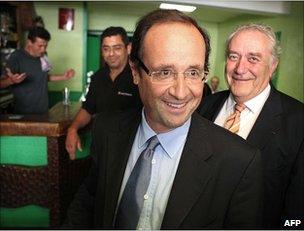
Won 39% in first round.
Enjoys the unlikely honour of being <link> <caption>praised by former conservative President Jacques Chirac</caption> <url href="http://www.bbc.co.uk/news/world-europe-13710626" platform="highweb"/> </link> , Mr Sarkozy's predecessor and one-time mentor.
"It is not his pink [ie leftist] panache but his cordiality and his humanity that make him attractive [to Mr Chirac]," wrote the left-of-centre French newspaper Liberation.
Known chiefly as the Socialist Party's leader for nearly a decade, he stood down soon after the 2007 presidential election amid acrimony over the defeat of Ms Royal, his partner and mother of his children.
It has since emerged he was having an affair with journalist Valerie Trierweiler, his current partner.
He is considered to be a formidable campaigner and debater but may lack charisma, and has never held any government position despite serving as an MP since 1988.
Born 12 August 1954 in Rouen, he was educated at the ENA administration school and another elite institution, Sciences Po.
He long served as mayor of Tulle in the central region of Correze, which he still represents.
Martine Aubry
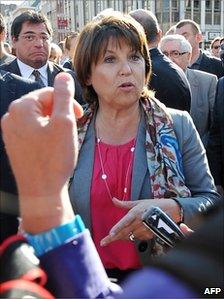
Won 30% in first round.
Daughter of former European Commission President Jacques Delors, she is seen as someone capable of rallying the left, and has led the party since the turbulence after the 2007 defeat.
As labour minister from 1997-2000, she implemented the 35-hour week - known in France as the "Aubry Law" - and universal sickness cover, as well as overseeing an important youth employment scheme.
In cabinet, she took much of the credit for unemployment in France falling below 10% for the first time in many years.
She is one of Ms Royal's fiercest rivals, opposing her both in style and substance within the Socialist Party.
<link> <caption>Declaring her bid </caption> <url href="http://www.bbc.co.uk/news/world-europe-13941425" platform="highweb"/> </link> on 28 June, she said: "I want to restore France's strength, its calm and its unity. I want to give a taste for the future and a desire for a common destiny back to everyone."
Critics say she is not an inspirational figure, she shows indecision, she is not media-friendly and she is only standing for want of a stronger candidate such as Mr Strauss-Kahn.
Born on 8 August 1950 in Paris, she was educated at ENA and other institutions. She has been mayor of the important northern city of Lille since 2001.
Arnaud Montebourg
Won 17% in first round.
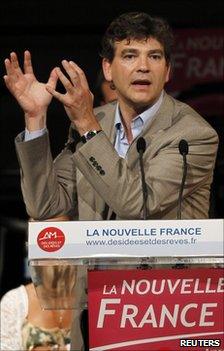
Youthful, of mixed race and photogenic, he is viewed by some as a dynamic, Obama-type figure; by others as inexperienced and even rash.
He made anti-globalisation the key theme of his campaign, arguing that the French economic model and welfare system were under attack.
Defending the interests of French manufacturing, he told Le Point magazine in June: "I don't want my country to resemble a giant hotel resort and spa."
In 2001, he ruffled foreign feathers with a <link> <caption>campaign against money laundering</caption> <url href="http://news.bbc.co.uk/2/hi/business/1590947.stm" platform="highweb"/> </link> in Switzerland and the City of London.
While acting as Ms Royal's campaign spokesman in 2007, he made a major gaffe by joking on television that the then presidential candidate had "only one failing - her companion".
For dragging the Royal-Hollande relationship into the spotlight just months before the vote, he was suspended as spokesman for a month.
Born 30 October 1962, in Clamecy, Nievre, of French and ethnic Algerian extraction.
He studied law and politics in Paris but failed his ENA entrance examination. Represents the Saone-et-Loire region as MP.
Segolene Royal
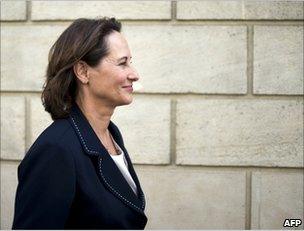
Won 7% in first round.
After famously losing to Mr Sarkozy by six percentage points in 2007, she rubbed salt into the Socialists' wounds by <link> <caption>accusing the party of letting her down</caption> <url href="http://news.bbc.co.uk/1/hi/world/europe/7126758.stm" platform="highweb"/> </link> during the campaign.
"I was caught in a pincer movement between apparatchiks from my own party on one side, and the right on the other," she said.
An unseemly row was aggravated by the deterioration of her relationship with Mr Hollande.
Socialist voters may also remember her for a lacklustre campaign and an inability to land an effective blow on Mr Sarkozy during <link> <caption>the presidential election debate</caption> <url href="http://news.bbc.co.uk/1/hi/world/europe/6617835.stm" platform="highweb"/> </link> .
She remained undaunted. After announcing her new bid in January, she delivered <link> <caption>her first major speech</caption> <url href="http://plus.lefigaro.fr/note/segolene-royal-wants-to-be-the-candidate-of-the-people-20110121-380038" platform="highweb"/> </link> in a northern mining town, Bully-les-Mines, where she declared: "I have come to give back power to the people."
Born on 22 September 1953 in the French colony of Senegal, and educated at Sciences Po and ENA, she served as a government minister between 1992 and 2002 but did not hold any high-powered cabinet jobs.
Since 2004, she has headed the regional government in Poitou-Charentes, central-western France.
Manuel Valls
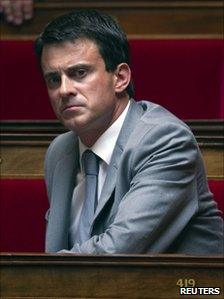
Won 6% in first round.
The same age as Mr Montebourg and equally photogenic, his politics are very different - he was seen as the choice of the right within the Socialist Party, his policies likened to those of Tony Blair's New Labour in the UK.
Under the slogan "Need for optimism on the left!", he rejected the 35-hour week as a party "taboo".
Speaking in Paris on 6 July, he dismissed the kind of anti-globalisation advocated by Mr Montebourg as an "ideological simplification which nurtures fears".
The Essonne MP is mayor of Evry, just south of Paris, which has the dubious honour of being one of the country's poorest towns.
A strong believer in European integration, he favours EU membership for mainly Muslim Turkey but <link> <caption>campaigned against halal supermarkets</caption> <url href="http://news.bbc.co.uk/2/hi/europe/4405790.stm" platform="highweb"/> </link> in his town, arguing that they were divisive.
Born a Spaniard in Barcelona on 13 August 1962, he was naturalised in France 20 years later.
He studied history at university in Paris, and joined the Socialist Party at the age of 17.
- Published16 October 2011
- Published13 July 2011
- Published28 March 2011